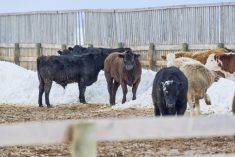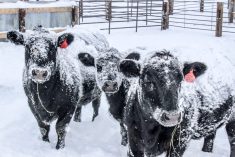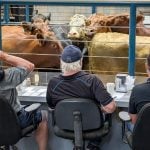Western Canadian feeder cattle were traded $3 to $5 below week-ago levels, with replacements over 700 lbs. absorbing the bulk of the decline.
Despite the sharp drop in barley prices, uncertainty in the deferred cash fed cattle prices caused feedlots operators to back away from the market. Secondly, ideas are that yearling prices will weaken into the fall period as supplies build. The market is on weak footing and the slightest turmoil could pull the rug; therefore, buyers are being overly cautious. The cattle-feeding investor may sit our a round or two until the margins stabilize. Without this demographic, the market has a large void because these players have been the aggressive leaders over the past couple of years. The risk is overwhelming relative to the returns.
Read Also

U.S. grains: Chicago grain prices fall amid profit-taking and dollar rebound
Chicago | Reuters – Chicago corn, soybean and wheat futures fell on Friday, pressured by profit-taking and a rebound in…
Mixed steers weighing 850-900 lbs. were quoted at $160-$165 landed in southern Alberta; larger-frame Angus-based lower-flesh heifers averaging 900 lbs. were quoted at $165 in central Alberta, which was a bright spot on the market.
Calves were also weaker with extreme variability due to limited buying interest. For the most part, 500- to 600-lb. calves were trading from $200 to $210 across the Prairies, with quality heifers of the same weight ranging from $180 to $190. There is no shortage of pasture and forage so we could see delayed marketings in the fall period. Recent rains have made putting up hay quite challenging, but upcoming crops couldn’t be better.
Feed barley dropped to the range of $180-$185 per tonne in southern Alberta for July and August delivery. Feed barley supplies will overwhelm domestic demand during harvest and offshore movement is non-existent.
For fed cattle market news, the U.S. economy appears to be rejuvenated after a sluggish spring. The jobs report came in better than expected and stocks surged just short of a record high. Wholesale beef prices ticked higher this past week as beef consumption absorbs the larger production levels. Buyers have anxiety hangover after the last couple of rounds of feeding, but the economic news is looking more favourable.
— Jerry Klassen is manager of the Canadian office for Swiss-based grain trader GAP SA Grains and Produits. He is also president and founder of Resilient Capital, which specializes in proprietary commodity futures trading and commodity market analysis. Jerry owns farmland in Manitoba and Saskatchewan but grew up on a mixed farm/feedlot operation in southern Alberta, which keeps him close to the grassroots level of grain and cattle production. Jerry is a graduate of the University of Alberta. He can be reached at 204-504-8339.















